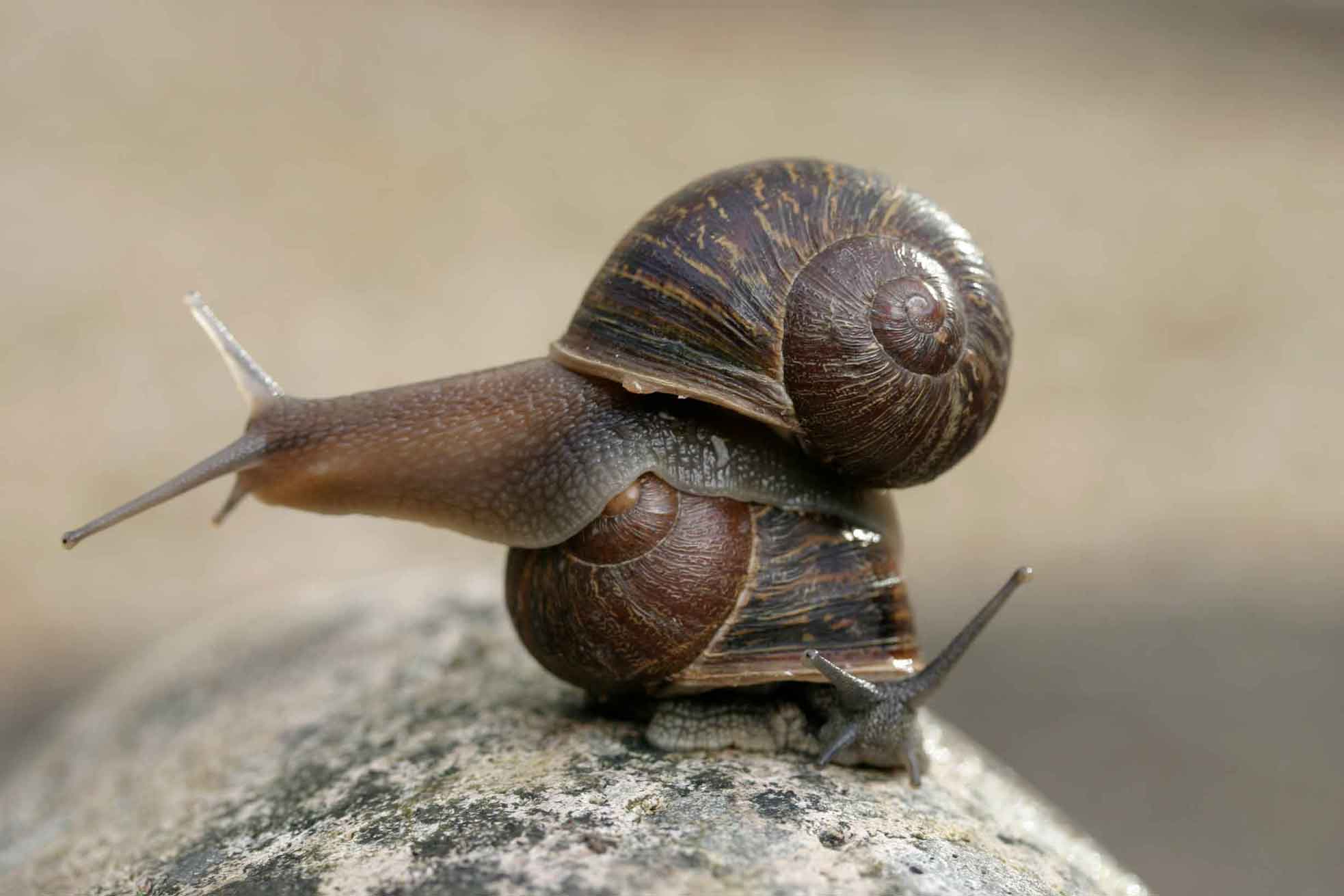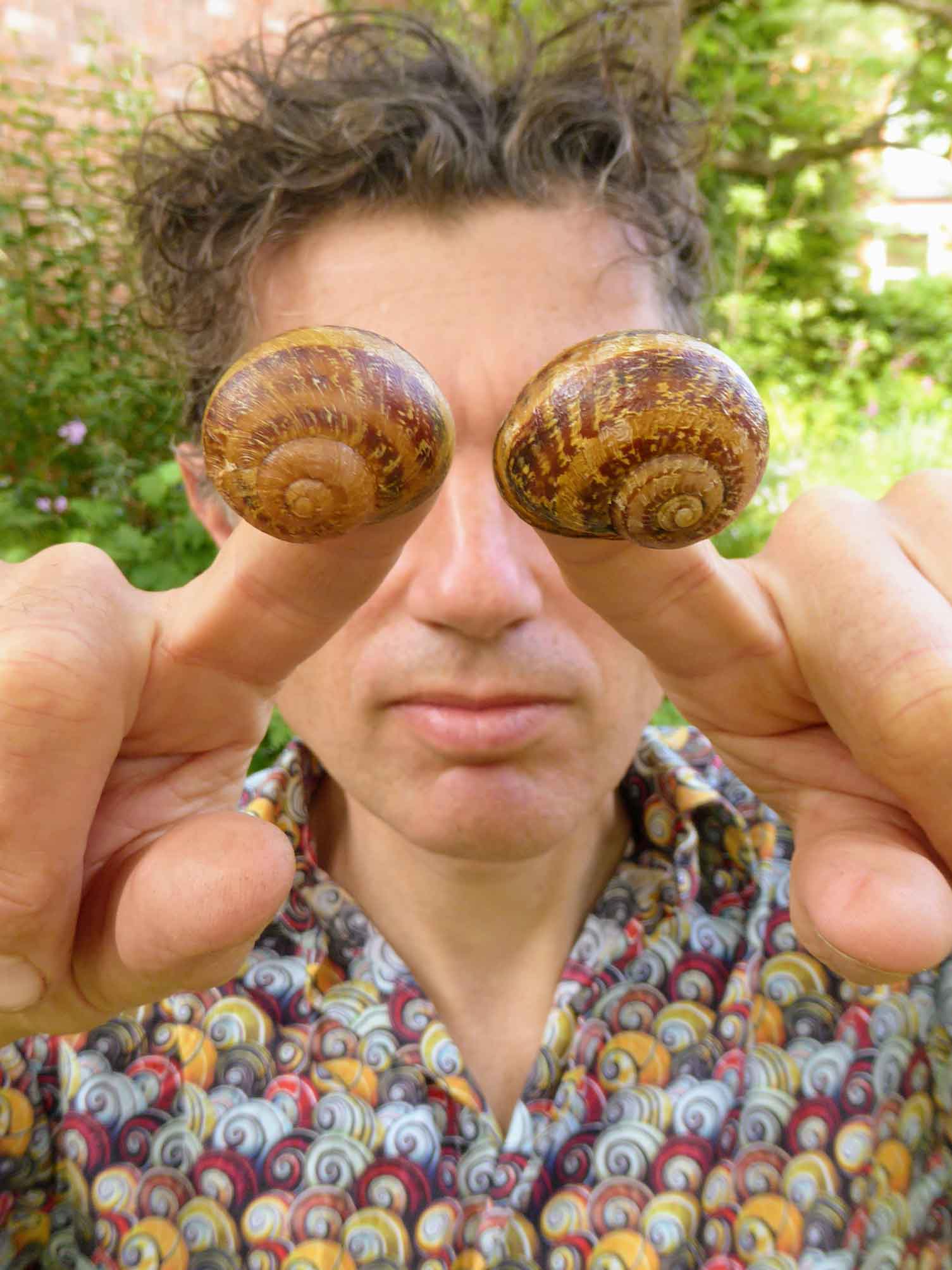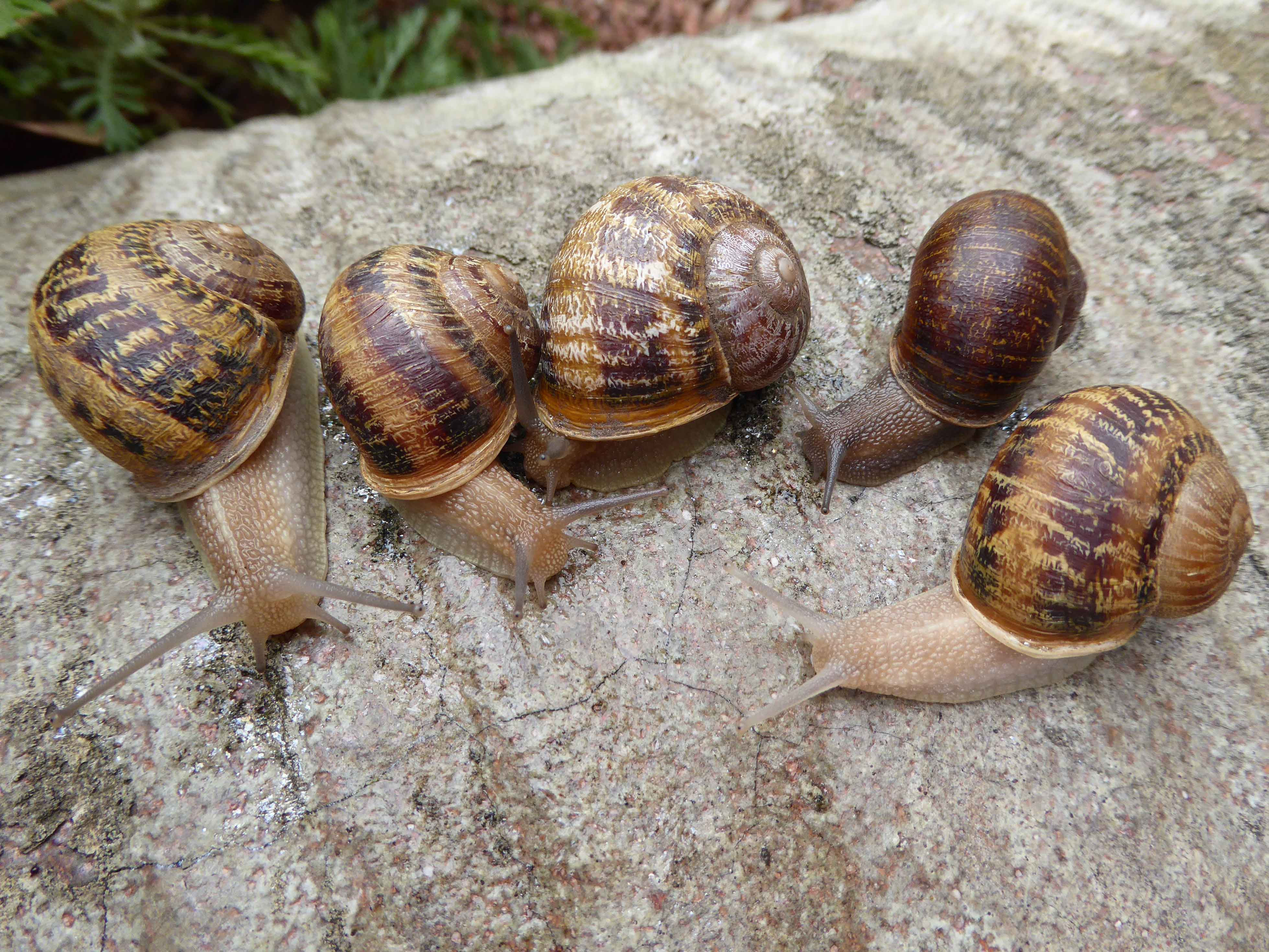Wednesday, 03 June 2020
A global campaign to help find a mate for a left-coiling snail called ‘Jeremy’ has enabled scientists to understand how mirror-image garden snails are formed.
The findings, published today in the journal Biology Letters, show that the rare left-spiralling shell of some garden snails is usually a development accident, rather than an inherited condition.
In October 2016, evolutionary geneticist Dr Angus Davison in the University of Nottingham’s School of Life Sciences appealed to the public for their help in match-making for Jeremy, a garden snail with a rare left-coiling shell.
 Sinistral Jeremy garden snail on top of dextral
Sinistral Jeremy garden snail on top of dextral
Dr Davison hoped to use the offspring from Jeremy to study the genetics of this condition, because his previous work on snails had given insight into understanding body asymmetry in other animals, including humans. But another left-coiling snail had to be found first. As well as a mirror-imaged shell, Jeremy had genitals on the opposite side making it very difficult for the snail to mate with normal snails.
The science to unravel this mystery was made possible by the involvement of the general public in finding a mate for Jeremy, initially via an appeal put out on BBC Radio Four’s Today programme, and then the wider media using #snaillove.
Jeremy became a global sensation and internet ‘shellebrity’. More than 1,000 news, radio, television and science articles, including the BBC and New York Times, highlighted the plight of the lovelorn snail. A graphic novel featuring the snail is now in development.
 Dr Angus Davison with dextral on right finger and sinistral on left
Dr Angus Davison with dextral on right finger and sinistral on left
By bringing together a worldwide group of citizen scientists, and the snails that they had found, Dr Davison used the publicity to understand what makes an exceptional reversed-coiled snail such as Jeremy.
Altogether more than 40 lefty snails were found by citizen scientists, in the wild and from snail farms. Davison and the citizen scientists bred the lefty snails together to test whether their occurrence was due to an inherited condition. Over three years, nearly fifteen thousand eggs were hatched from four generations of snails, including Jeremy.
Initially, Jeremy had been left ‘shell-shocked’ after being given the cold shoulder by two suitors who seemed to prefer each other. Then, shortly before Jeremy’s death, one mate produced a batch of 56 babies, about one-third of which were likely to be ‘fathered’ by Jeremy.
The new evidence shows that rare lefty garden snails are not usually produced due to an inherited condition. Instead, they are mainly produced by a developmental accident.
This finding has relevance to understanding the common factors that define animal asymmetry, including humans, and the origin of rare reversed individuals in other animal groups.
 Snail love: L-R -Senda, Jara, Tomeu, Jeremy and Indi
Snail love: L-R -Senda, Jara, Tomeu, Jeremy and Indi
"After a long search for a mate, and several mishaps along the way, Jeremy finally produced offspring, which delighted me – and the rest of the world. We were then able to use Jeremy’s offspring and the offspring from other lefties to discover how these mirror-imaged individuals are produced. Our findings showed that it is usually a developmental accident, rather than an inherited condition, that makes a lefty garden snail.
“We helped solve one of nature’s puzzles, which was very satisfying. There was also a happy ending for Jeremy, the snail, in finding love and producing offspring, albeit just before dying. None of this would have been possible without the public’s help.
"We have learned that two lefties usually make a right, at least if you are a garden snail. In other snails, being a lefty is an inherited condition, but we still don’t really know how they do it. If we are able to find out, then this may help us understand how the right and left side of other animal bodies are defined, including ourselves."
You could say that we tried to recreate what made Jeremy different, but this was not possible. Jeremy was special.”
Story credits
More information is available from Dr Angus Davison in the School of Life Sciences at the University of Nottingham, at angus.davison@nottingham.ac.uk
Notes to editors:
About the University of Nottingham
Ranked 97 in the world and 17th in the UK by the QS World University Rankings, the University of Nottingham is a founding member of Russell Group of research-intensive universities. Studying at the University of Nottingham is a life-changing experience, and we pride ourselves on unlocking the potential of our students. We have a pioneering spirit, expressed in the vision of our founder Sir Jesse Boot, which has seen us lead the way in establishing campuses in China and Malaysia - part of a globally connected network of education, research and industrial engagement.
Nottingham was crowned Sports University of the Year by The Times and Sunday Times Good University Guide 2024 – the third time it has been given the honour since 2018 – and by the Daily Mail University Guide 2024.
The university is among the best universities in the UK for the strength of our research, positioned seventh for research power in the UK according to REF 2021. The birthplace of discoveries such as MRI and ibuprofen, our innovations transform lives and tackle global problems such as sustainable food supplies, ending modern slavery, developing greener transport, and reducing reliance on fossil fuels.
The university is a major employer and industry partner - locally and globally - and our graduates are the third most targeted by the UK's top employers, according to The Graduate Market in 2024 report by High Fliers Research.
We lead the Universities for Nottingham initiative, in partnership with Nottingham Trent University, a pioneering collaboration between the city’s two world-class institutions to improve levels of prosperity, opportunity, sustainability, health and wellbeing for residents in the city and region we are proud to call home.
More news…